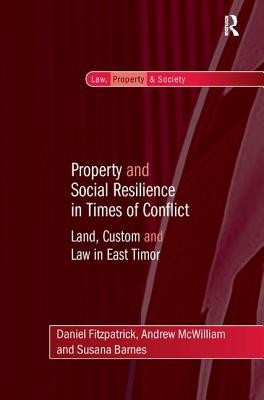
- We will send in 10–14 business days.
- Author: Daniel Fitzpatrick
- Publisher: Routledge
- ISBN-10: 1409453812
- ISBN-13: 9781409453819
- Format: 15.6 x 23.4 x 1.9 cm, kieti viršeliai
- Language: English
- SAVE -10% with code: EXTRA
Property and Social Resilience in Times of Conflict (e-book) (used book) | bookbook.eu
Reviews
Description
Peace-building in a number of contemporary contexts involves fragile states, influential customary systems and histories of land conflict arising from mass population displacement. This book is a timely response to the increased international focus on peace-building problems arising from population displacement and post-conflict state fragility. It considers the relationship between property and resilient customary systems in conflict-affected East Timor. The chapters include micro-studies of customary land and population displacement during the periods of Portuguese colonization and Indonesian military occupation. There is also analysis of the development of laws relating to customary land in independent East Timor (Timor Leste). The book fills a gap in socio-legal literature on property, custom and peace-building and is of interest to property scholars, anthropologists, and academics and practitioners in the emerging field of peace and conflict studies.
EXTRA 10 % discount with code: EXTRA
The promotion ends in 21d.08:26:29
The discount code is valid when purchasing from 10 €. Discounts do not stack.
- Author: Daniel Fitzpatrick
- Publisher: Routledge
- ISBN-10: 1409453812
- ISBN-13: 9781409453819
- Format: 15.6 x 23.4 x 1.9 cm, kieti viršeliai
- Language: English English
Peace-building in a number of contemporary contexts involves fragile states, influential customary systems and histories of land conflict arising from mass population displacement. This book is a timely response to the increased international focus on peace-building problems arising from population displacement and post-conflict state fragility. It considers the relationship between property and resilient customary systems in conflict-affected East Timor. The chapters include micro-studies of customary land and population displacement during the periods of Portuguese colonization and Indonesian military occupation. There is also analysis of the development of laws relating to customary land in independent East Timor (Timor Leste). The book fills a gap in socio-legal literature on property, custom and peace-building and is of interest to property scholars, anthropologists, and academics and practitioners in the emerging field of peace and conflict studies.


Reviews